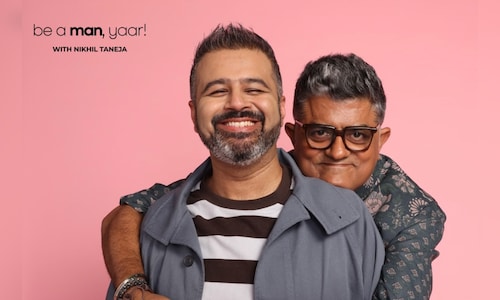From Bollywood A-listers such as Vicky Kaushal, Kartik Aaryan, Karan Johar and veterans like Boman Irani, Javed Akhtar, Naseeruddin Shah to social media stars including Bhuvan Bam and Zakir Khan, he’s had some of the most popular men of the country to deconstruct what it means to be a man in India today.
The co-founder and CEO of Yuvaa, a Gen-Z focused media company that’s been questioning, challenging, and redefining popular norms with every conversation, Taneja is a staunch advocate of gender equality, mental health, and positive masculinity.
In this free-wheeling interaction during the recently-held Kommune’s Spoken Fest in Mumbai, he talks about Be A Man, Yaar!, making it to New York’s Times Square, plans of inviting guests from around the world, the need to include men in the fight for equality, his secret sauce to being a successful content creator, why it’s crucial to make the important interesting, and more.

What was your vision and intention behind starting Be A Man, Yaar!?
We go to a lot of campuses with my company Yuvaa and do something called the Yuvaa Roadshow of Kindness, through which we try to create safe spaces for young people to express themselves. Every college that we’d go to, we’d hear a lot of boys talk about how they feel lonely. But when we’d ask them why they didn’t talk to each other, we realised they just didn’t know how to.
As we talked further and deeper with them we understood that because of the patriarchal society we live in, the understanding that young boys get from their homes is that the empathy comes from the mother and the distance or the toughness comes from the father. Boys therefore have a very good sense of how to be empathetic or vulnerable in front of a woman. But they don’t necessarily have an understanding of how to be vulnerable in front of another man.
Unless they have alcohol or if something really emotional has happened with them, it’s very rare that boys are going to be comfortable in creating safe spaces with each other. So I wanted to start Be A Man, Yaar! as an example to show that two men can actually sit together and have a very deep, vulnerable, kind, empathetic, sensitive conversation. You don’t necessarily need alcohol or an occasion for it. It’s not just okay, it’s important that men create these spaces for each other so that we can all feel less lonely.
Now that you’ve made it to Times Square, what’s your plan ahead?
I hope we make it to Times Square every season. There are so many more conversations that are yet to be had, many more topics to dive deeper into. I think with Bhuvan’s episode last year, we saw the most honest, beautiful and raw form of what this show can look like. It did phenomenally well because you could see a youth icon like Bhuvan Bam opening up for the first time in a very emotional way on camera.
There is a lot of pent up emotion in a lot of men we see and admire. I want to make sure that my show is able to create a space that allows as many incredible folks that we admire to come and open up.
Going forward, I want to make sure that Be A Man, Yaar! also has folks from outside of India—Indian-Americans, South Asian men, I would love to have folks like Atif Aslam and Fawad Khan on the show. Hopefully it becomes an international show to have conversations around not just Indian but South-Asian masculinity.
Why is it important to have conversations around masculinity?
Because we are only talking to women about gender equality. We are putting the burden on them to achieve that equality on their own. But equality cannot be achieved if all genders don’t work together for it.
If men are not involved in the conversation on gender, then we are only again creating a bubble with events and panels but without the people who actually need to understand, which is men, that equality is important. So they need to be included. We need to realise that patriarchy does not just oppress women. Men are also victims of it. If we create a more equal world, men will also benefit from it.
It, therefore, is very important to have this conversation so that men can have kinder, more empathetic lives where they don’t have to keep things inside of them, where they can have healthy conversations with their families, partners, and are able to live life with more joy.
How do you decide which guests to invite on the show?
I put together a list of all the folks that I think have authentic and vulnerable stories to offer. I’m trying very hard to not have men who have problematic points of view, who disrespect women, have a patriarchal view of the world or don’t believe that conversations can help. So anybody who I think is a softie or a pookie, as they call it in today’s world, among celebrities and well-known figures, I would love to have them on the show to dive deeper in their stories.
You had a B.Tech in Computer Engineering from NIT Kurukshetra and two cushy job offers in hand. What was it about the media and entertainment industry that made you leave all of it for an impossible, improbable dream?
I did engineering because I was not given an option. In fact, my story at the Spoken Fest was about that. That as a boy in India, the only choices you’re given are engineering, MBA, law or doctor.
If you have any other passion, hobby or something else that brings you joy, boys often are not even given the choice to have those opportunities because in India if you’re a boy, your entire life will be measured in the money you make. Hence, it’s very important that some of us have the courage to break out of these ideas and norms.
I was fortunate enough to realise it in time. Even though I finished my engineering, I realised that I have a passion for creative arts, writing, and storytelling. I negotiated some time with my parents. I asked them to give me three years. I told them if I’m not able to make it in this field, I will do an MBA and go back to corporate life. Fortunately, I was able to do okay and I’ve been here now for the last 17 years.
It was a tough decision, but it was the most crucial decision of my life that I went after my heart. But I also have the privilege of having parents who gave me that opportunity to prove myself and supported me, even though they constantly kept checking on the timeline I’d given them. Thankfully, I was also able to make something of myself.
What do you think has worked for you?
I genuinely believe in the idea of empathy. I believe that stories bring people together, that vulnerable conversations and ideas are important in this world, which is going nuts at this point in time. We are far more divided than we’ve ever been.
We need to care about and nurture the things that bring us together, form community, and begin and end at love. We need more alternatives. They do not necessarily have to be companies and work. You as a human being can also be an alternative. You can reject the anger, the toxicity, the aggression of the world. As human beings, we can try to have value systems that are biased towards empathy and kindness.
It’s been a tough journey. It’s not easy to be kind in a world which can be very unkind sometimes. But if you believe in it and go behind it with all your heart, you can create spaces that foster that. So I’m very grateful that I’ve been able to create that space with Yuvaa. And I hope I keep on doing it, especially in the kind of world we’re living in.
What’s your guru mantra to make the important interesting?
If we want more people to be included in the things that we care about in the world, whether it is mental health, gender equality, empathy, climate action, LGBTQ issues, we need to do it from a lens of entertainment, joy. If we only do it from the lens of importance or preaching, people will get bored. If we don’t make important things interesting, then the interesting things will end up becoming important. That’s the danger of the world we’re living in. We don’t want too many interesting things to become important.
As someone who has successfully harnessed the power of social media, how do you know when you need to touch grass?
I don’t know, to be very honest. I’m not very good at it. I keep getting burnt out and then realising that I need to take a break. But my wife is very good at pointing out to me when I am in too deep. She keeps pulling me away and making sure that I am taking those breaks. My wife really helps me.
The other folks in my family also keep pointing out that I’m too online. So I ensure that I have a community with Yuvaa, my friends and family. I try to spend as much time with people as I spend on the internet. That’s a very important thing that I try to do. But I’m not very good at it.
The single most important advice that you’d want to give people wanting to make a career in content creation?
Find your truth. I know it sounds extremely generic, but everybody has a truth that is unique to them, that only they understand and are incredible at. It could be a value system, something you’re passionate about, a way of communication, something creative. But if you don’t know your truth, you’re always going to be following the trends that others are setting instead of creating some of your own.
But if you know your truth and you start putting it out into the world, there’s a good chance that people will follow you. So, spend time digging deep, figuring out who you are and why you’re doing what you’re doing. The day you figure that out, people will want to hear what you have to say because most of them are clueless, they don’t know their truths either. So they always get inspired by people who have a sense of who they are.


